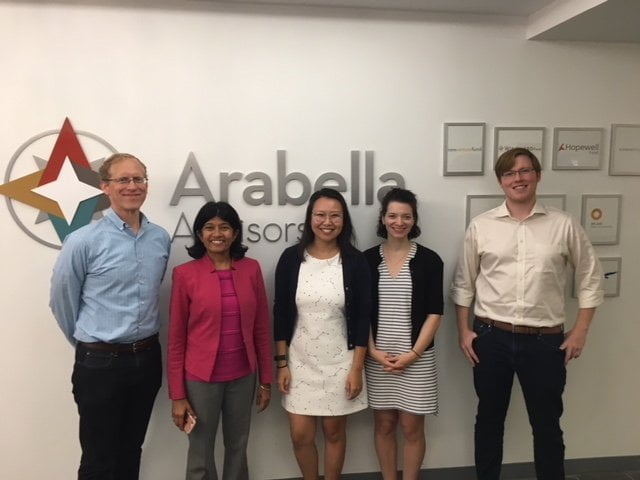Better Than Most is a regular feature of The Business of Giving, examining the best places to work among social good businesses and nonprofit organizations.

Denver: And this evening, you will be going down to Connecticut Avenue in Washington, D.C. to visit the offices of Arabella Advisors, a consulting firm that helps clients improve the world through philanthropy and impact investing. We will begin the segment with their Chief Executive Officer Sampriti Ganguli and then hear from some of the other members of the Arabella team.
Sampriti: The first is we create as much transparency as we can with regard to the financial performance of the organization, which is unusual for a privately-held company, but we believe it’s really important so that each individual in the organization has a view and a window into the direction we’re going strategically, how we are managing the firm financially, and the relationship that we hope to have with the philanthropic sector.
Andrew: … something called conversation cafés popped up organically in our Chicago office. It is an informal meeting where everyone gets together to discuss things that are happening in current events and talk about how they affect employees at Arabella. So as Sampriti mentioned, we talk about things relating to race, sex, class, sexual orientation. We adopted this in D.C. as well, and we formalized it a little bit further and it made almost–I wouldn’t call it a training program, but it’s certainly informative and designed to ultimately be actionable.
Sampriti: So we’ve had a series of initiatives to really improve that metric including one that I am particularly most proud of, which is a role that we’ve created called Inclusion Leaders at Arabella. These are individuals at all levels in the organizations in each of our teams across each of our four offices whose job it is to ensure that we are creating safe spaces to hear voices, that we are encouraging individuals to speak up on things that they believe the organization needs to do better on, and also addressing issues related to systemic inequity, structural racism, and other issues of our time. And that’s been a really powerful way to make sure that we are as committed to the principles of diversity, equity, and inclusion not just by what we say but also by what we do.
Abbie: One way that Arabella works to break down silos between teams is to take groups out for lunch every so often. It’s called Arabella Does Lunch. It’s voluntary, but if you sign up, you’re randomly assigned a group of five or six people to eat with and Arabella treats you to lunch. I think it’s a great way to meet people on other teams and at different levels across the organization that I might not meet in the course of my everyday work.
Misheel: I think that Arabella is a great place for internal opportunities especially since we have a personal professional development budget where we can use that to grow professionally. And the finance department, we do monthly trainings to learn more about nonprofit accounting and as well as weekly check-ins with our supervisors to go over our developmental goals and really see where we are personally and professionally. There’s a lot of internal opportunities within Arabella for promotions. The supervisors, they really see how you’re doing, they value your work, and I think I’m a perfect example.
Steve: I’ve been the coach of my daughter’s soccer team, and even though Arabella works very hard for our clients and our teams work very hard to help our clients deliver the impact that we all care about, and sometimes that means putting in extra hours or staying up late to meet a deadline, I’ve never missed a soccer practice because the team always covers for me. The other folks always step in when they need to and I look to do the same for them.
Abbie: I’ve also been able to take time outside of work for training and development and I appreciate that investment and support from the team in allowing me to step away from my client-related work to work on my own personal development in a way that ultimately informs the work.

Misheel: I think the wow factor of Arabella that I initially thought of was when I was first hired, and I was sitting at home on a Saturday morning and the doorbell rang. And I was like, “Okay. Do we have a package coming in?” And then comes a box from Arabella Advisors. And I’m like, “What is that? What’s happening?” And I open it to see a welcome box of snacks, of an Arabella Advisors sunglasses, a really nice handwritten note, a card, and a gift card. I think that was really a wow factor for me, saying “Wow. Okay. This is really a workplace that–a company that really wants to hire me, wants to really make me feel included.” And of course, I took pictures, sent it to my friends saying, “Does your company do that?” So that’s always a great story for me to tell to people about Arabella.
Andrew: I think one of my favorite qualities about the firm overall, and this keeps being confirmed to me on a consistent basis, is the approachability of management. We are not a flat structure by any means. There is certainly a hierarchy in place. But I think from day one to right now, the level of transparency and willingness to interact with junior staff members on the part of management is a huge, huge benefit that I’m not sure we can quantify the value of. Specific examples, I can see Sampriti’s calendar. I know what she is doing today. There’s open Skype messaging so there are no technological barriers to interacting with your managers, and in fact, they often explicitly tell you to lean on them, to approach them, to interact.
Steve: When I talk to people outside Arabella about what we do and want to sort of impress them, one of the things I feel most excited about telling them about are stories about our ability to kind of respond to issues that come up in the news all the time. And so recently, with the hurricanes that have hit the United States, I was able to tell people that a group that I work with helped to launch the Center for Disaster Philanthropy, which is now doing all kinds of work to address, to help the people on the ground recover from the hurricanes. And because of our work several years ago with them, to see them now stood up as a partner to Facebook that’s helping to move millions of dollars to help other people, it’s a great testament to the work that we’ve been able to do here.
Sampriti: One of the things that I think about in terms of rituals for Arabella is how we try to keep connections with individuals even when they no longer work at the firm. Like any professional services firm, we have turnover. And the question is this, how do you deal with individuals not just when they come into the organization, but how do you try to retain that when they leave the organization? We invite all of our Arabella alumni. We call them to our holiday parties at the end of the year. We want to make sure that they are part and parcel of the Arabella family.

Denver: I want to extend my thanks to all those who participated in this piece: Sampriti Ganguli, Abbie Roberts, MIsheel Davaatseren, Andrew Grainey, and Steve Sampson. If you should want to listen to this again, read the transcript, or maybe see pictures of the participants and the offices of Arabella Advisors, you can find them all at denver-frederick.com.
The Business of Giving can be heard every Sunday evening between 6:00 p.m. and 7:00 p.m. Eastern on AM 970 The Answer in New York and on iHeartRadio. You can follow us @bizofgive on Twitter, @bizofgive on Instagram and at http://www.facebook.com/BusinessOfGiving

